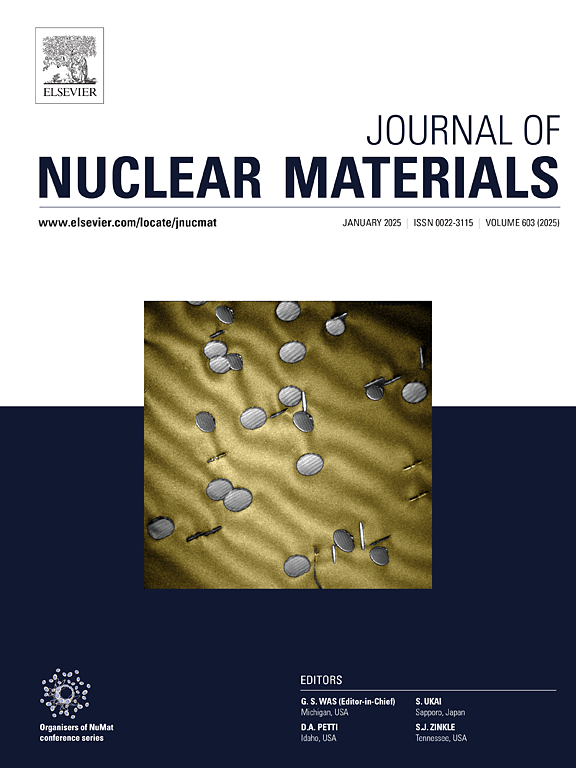The behavior of Helium in (Ti1-xZrx)3SiC2 by first-principles study
IF 2.8
2区 工程技术
Q3 MATERIALS SCIENCE, MULTIDISCIPLINARY
引用次数: 0
Abstract
The properties of (Ti1-xZrx)3SiC2 (x = 0, 0.04, 0.06, 0.09, 0.13, and 0.17) and the behavior of helium within (Ti1-xZrx)3SiC2 were investigated through first-principles calculations. It was found that the (Ti1-xZrx)3SiC2 ceramics are all thermodynamically stable, while their thermal stability decreases as the Zr content increases. Additionally, the substitution of Zr for Ti results in a lattice expansion of the system. It was observed that helium tends to occupy the interstitial sites near the Si layer in (Ti1-xZrx)3SiC2. As the concentration of Zr increases, the interaction between helium and surrounding atoms weakens, leading to a higher solubility of helium in (Ti1-xZrx)3SiC2. Furthermore, with increasing Zr concentration, the diffusion energy barrier for interstitial helium gradually increases. This likely results in greater difficulty for helium migration, thus enhancing the stability of this material. Therefore, it is concluded that substituting Zr for Ti is one of the beneficial ways to enhance the radiation resistance of Ti3SiC2.
通过第一原理研究氦在(Ti1-xZrx)3 SiC2 中的行为
通过第一性原理计算研究了 (Ti1-xZrx)3SiC2 (x = 0、0.04、0.06、0.09、0.13 和 0.17)的性质以及氦在 (Ti1-xZrx)3SiC2 中的行为。研究发现,(Ti1-xZrx)3SiC2 陶瓷都具有热力学稳定性,但其热稳定性随着 Zr 含量的增加而降低。此外,用 Zr 替代 Ti 会导致系统晶格膨胀。据观察,氦倾向于占据 (Ti1-xZrx)3SiC2 中靠近硅层的间隙位置。随着 Zr 浓度的增加,氦与周围原子的相互作用减弱,导致氦在(Ti1-xZrx)3SiC2 中的溶解度增加。此外,随着 Zr 浓度的增加,间隙氦的扩散能障也逐渐增加。这可能会增加氦迁移的难度,从而提高这种材料的稳定性。因此,可以得出结论:用 Zr 替代 Ti 是增强 Ti3SiC2 抗辐射性的有利方法之一。
本文章由计算机程序翻译,如有差异,请以英文原文为准。
求助全文
约1分钟内获得全文
求助全文
来源期刊

Journal of Nuclear Materials
工程技术-材料科学:综合
CiteScore
5.70
自引率
25.80%
发文量
601
审稿时长
63 days
期刊介绍:
The Journal of Nuclear Materials publishes high quality papers in materials research for nuclear applications, primarily fission reactors, fusion reactors, and similar environments including radiation areas of charged particle accelerators. Both original research and critical review papers covering experimental, theoretical, and computational aspects of either fundamental or applied nature are welcome.
The breadth of the field is such that a wide range of processes and properties in the field of materials science and engineering is of interest to the readership, spanning atom-scale processes, microstructures, thermodynamics, mechanical properties, physical properties, and corrosion, for example.
Topics covered by JNM
Fission reactor materials, including fuels, cladding, core structures, pressure vessels, coolant interactions with materials, moderator and control components, fission product behavior.
Materials aspects of the entire fuel cycle.
Materials aspects of the actinides and their compounds.
Performance of nuclear waste materials; materials aspects of the immobilization of wastes.
Fusion reactor materials, including first walls, blankets, insulators and magnets.
Neutron and charged particle radiation effects in materials, including defects, transmutations, microstructures, phase changes and macroscopic properties.
Interaction of plasmas, ion beams, electron beams and electromagnetic radiation with materials relevant to nuclear systems.
 求助内容:
求助内容: 应助结果提醒方式:
应助结果提醒方式:


